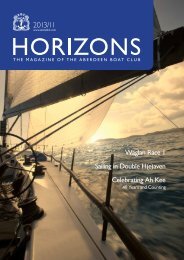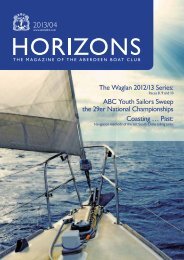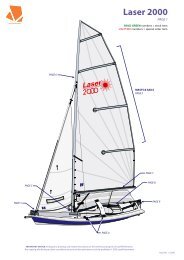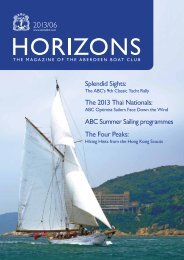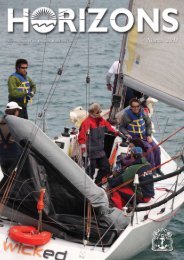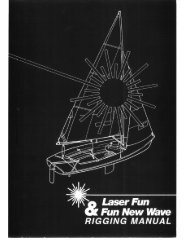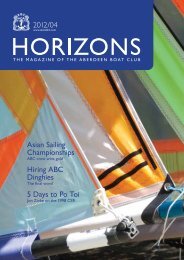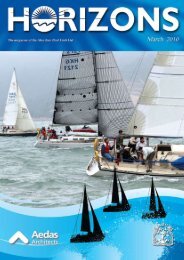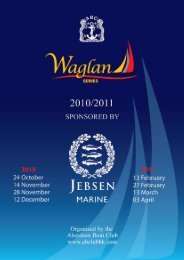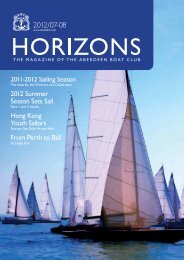Jan-Feb 2012 Issue - the Aberdeen Boat Club
Jan-Feb 2012 Issue - the Aberdeen Boat Club
Jan-Feb 2012 Issue - the Aberdeen Boat Club
You also want an ePaper? Increase the reach of your titles
YUMPU automatically turns print PDFs into web optimized ePapers that Google loves.
P.17<br />
mast. Ellen Macarthur is a big believer<br />
in this, and has been known to dash<br />
from interviews to scratch <strong>the</strong> nearest<br />
mast when <strong>the</strong> ‘unmentionable ones’ are<br />
mentioned. This superstition likely stems<br />
from <strong>the</strong> early days of sail when rabbits<br />
were loaded onboard ships as a supply<br />
of fresh meat during long voyages. They<br />
would often escape and would start<br />
gnawing through <strong>the</strong> manila ropes of <strong>the</strong><br />
ship’s rigging.<br />
Bananas on board. This one is believed<br />
to have originated in <strong>the</strong> days before<br />
shipping container, when cargoes were<br />
stored open in ships holds. Consignments<br />
of bananas would often contain spiders,<br />
snakes and o<strong>the</strong>r undesirables, which<br />
would crawl out and wreak havoc on<br />
<strong>the</strong> ship once at sea. So widespread and<br />
ingrained is this belief, and so deep is <strong>the</strong><br />
association between bananas and bad<br />
luck, that some captains reportedly won’t<br />
even allow Banana <strong>Boat</strong> sunscreen or<br />
Banana Republic clothing aboard.<br />
Whistling on board. It is believed<br />
that whistling onboard a ship ‘whistles<br />
up a storm’ or raises a gale which, if<br />
<strong>the</strong> whistling continues, will eventually<br />
develop into a fully fledged storm.<br />
Whistling in <strong>the</strong> direction of <strong>the</strong> wind is<br />
seen as particularly provocative to <strong>the</strong><br />
wea<strong>the</strong>r gods. However, some mariners<br />
believe this potential source of bad luck is<br />
limited to whistling on <strong>the</strong> bridge, while<br />
o<strong>the</strong>rs maintain that singing on <strong>the</strong> bridge<br />
is bad luck.<br />
Thanking <strong>the</strong> boat when you get<br />
home safely. Often defended as simple<br />
good manners, many sailors will make a<br />
point of thanking <strong>the</strong>ir boats as <strong>the</strong>y step<br />
off, often touching <strong>the</strong> bow . This relates<br />
to <strong>the</strong> bond many sailors develop with<br />
<strong>the</strong>ir boats, and is done more as a mark<br />
of respect and friendship for a vessel<br />
who has kept <strong>the</strong>m alive and well, than<br />
as a requirement to ward off bad luck in<br />
<strong>the</strong> future.<br />
Chinese superstitions. The Chinese<br />
have many superstitions regarding<br />
boats, not all of which involve being on<br />
a boat. When eating a whole fish it is<br />
considered extremely bad form to eat<br />
one side and <strong>the</strong>n flip <strong>the</strong> fish to eat<br />
<strong>the</strong> o<strong>the</strong>r. This is believed to symbolise<br />
<strong>the</strong> fishing boat capsizing, and in order<br />
to avoid this bad omen diners must eat<br />
down to <strong>the</strong> bone, remove <strong>the</strong> fish’s<br />
skeleton and continue eating.<br />
Throughout China and SE Asia<br />
captains believe that if <strong>the</strong>y cut across<br />
ano<strong>the</strong>r ship’s bow <strong>the</strong>n <strong>the</strong> bad luck<br />
following <strong>the</strong>ir vessel will attach itself <strong>the</strong><br />
o<strong>the</strong>r ship. Then whatever bad luck has<br />
been brought on <strong>the</strong> ship doesn’t matter<br />
(bananas, whistling etc.) as it is all now<br />
following someone else. Despite being<br />
in direct contravention of <strong>the</strong> Collision<br />
Regulations (<strong>the</strong> overtaking vessel<br />
must stay clear) this practice remains<br />
widespread and costs lives, vessels and<br />
cargo every year.<br />
Coins over <strong>the</strong> side. Some fishermen<br />
believe that a small handful of coins<br />
thrown over <strong>the</strong> side of <strong>the</strong> boat as <strong>the</strong>y<br />
leave port will guarantee a good catch.<br />
The coins are a symbolic toll to Neptune<br />
and smooth <strong>the</strong> way for travelling on his<br />
ocean and taking his fish. An alternative,<br />
less commonly held view is that <strong>the</strong> coins<br />
represent buying <strong>the</strong> fish from Neptune,<br />
instead of relying on luck to find and<br />
catch <strong>the</strong>m.<br />
Coins built into <strong>the</strong> boat. A gold coin<br />
placed in <strong>the</strong> keel during construction




